Fleurs du Mal Magazine


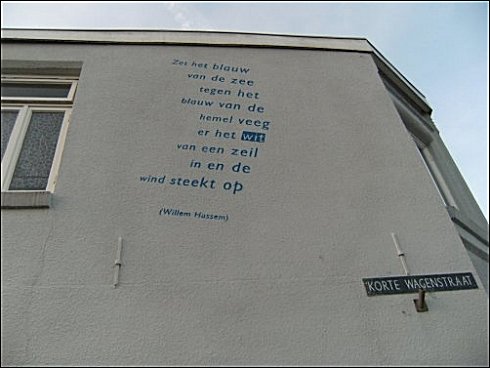
Gevelgedichten
in de gemeente Gilze en Rijen
Op markante gevels in Rijen, Molenschot en Gilze zijn drie gedichten op gevels geplaatst. Er volgen nog drie muurgedichten in Hulten, Rijen en Gilze. De kunstcommissie van de gemeente Gilze-Rijen hoopt er de komende jaren nog meer te kunnen realiseren.
*Willem Hussem
(Rotterdam 1900-Den Haag 1974)
‘Zet het blauw’
Plaats: Gilze
Hoek Nieuwstraat – Korte Wagenstraat
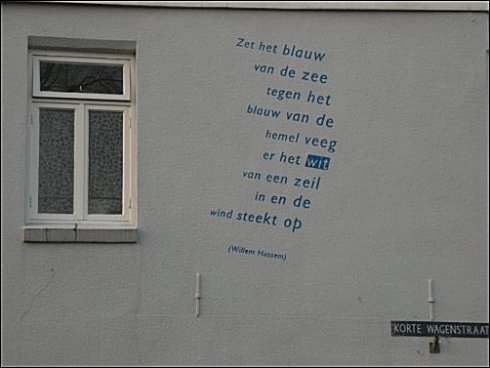
* Willem Kloos
(Amsterdam 1859-Den Haag 1938)
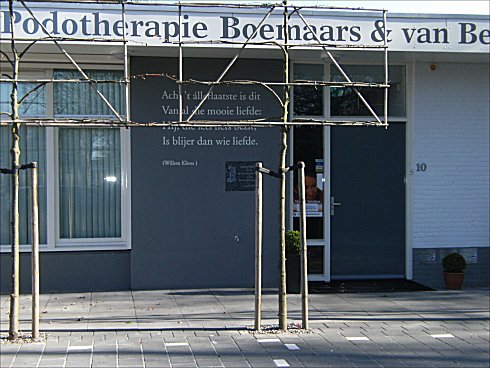
‘Ach, ‘t állerlaatste is dit’
Plaats: Molenschot
Praktijk voor podotherapie, Stappenakker
Ach, ‘t állerlaatste is dit
Van al die mooie liefde:
Hij, die iets liefs bezit,
Is blijer dan wie liefde.
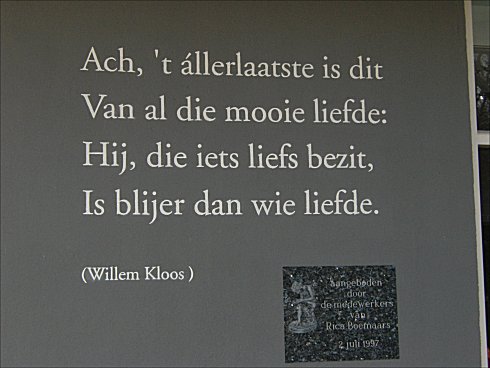
* K. Schippers
(Amsterdam 1936)
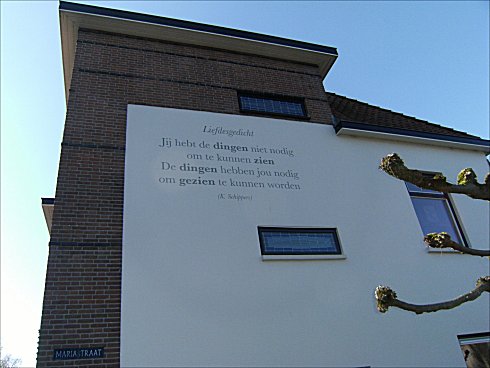
‘Liefdesgedicht’
Plaats: Rijen
Hoek Hoofdstraat – Mariastraat
Liefdesgedicht
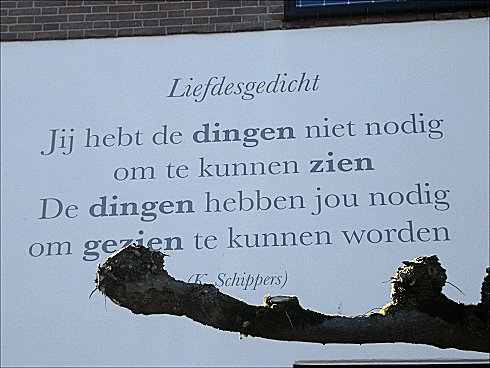
In voorbereiding:
Tjitske Jansen: Ridderstraat, Gilze
Erik van Os: Basisschool, Hulten
Herman Gorter: Raadhuisplein, Rijen
‘Gevelgedichten’ is een project van Hanneke van Kempen, Louis Chamuleau
en Jan de Jong namens de kunstcommissie Gilze en Rijen. De vormgeving
van de gedichten is van Frank Hermens (Hermens Concepts & Creations,
Rijen), het schilderwerk van Suk-Won Buter (Schildersbedrijf Buter,
Rijen). Met dank aan de eigenaren van de panden met de gevels achter de
gedichten.
Photos: Hanneke van kempen
fleursdumal.nl magazine
More in: Hanneke van Kempen, Street Art, Urban Art

Erika De Stercke
Gedicht
Draden lang
als zeewieren
gebruik je mij
glad en gemakkelijk verteerbaar
woelige woorden liggen op lakens
tussen zand en zwetende tenen
leugens, net kwallen kleven op
de badkuip
bruine randen
er waren al tekens
de muren houden hun verkalkte snavel dicht
op een halfnatte handdoek
ligt gescheurd een meisjesdroom
Erika De Stercke (Ninove 1968), woont en werkt in Gent. Ze volgde ‘Literaire creatie’ aan de Academie – afdeling Woord te Deinze en trad meermaals op bij slams en open podia in België en Nederland. Erika De Stercke was o.a. gastdichter bij Simon Vinkenoog – Onbederflijk Vers 2008 te Nijmegen. Erika De Stercke: “Schrijven geeft mij veel voldoening, soms ook wel frustratie als een woord mij niet loslaat. (…) Mijn rugzak zit vol met papierstrookjes waarop ik gedachten neerschrijf. (…) De verhalen van vrienden en gebeurtenissen in de stad, op de trein pik ik op en ze beginnen een eigen leven te leiden. Aan inspiratie geen gebrek.”
Erika De Stercke poetry
kempis poetry magazine
More in: De Stercke, Erika
.jpg)
.jpg)
Adriaan en de anderen
Een toekomstroman waarin de literatuur wordt gered
en het Huis van Oranje tot bloei komt
door Merel van der Gracht
achtentwintig
Virtuele wereld
Naomi stond voor de spiegel en deed haar make-up. Vanavond zou ze er extra goed uitzien in haar paarse jurkje. Gelukkig had ze nog ergens paarse oorbellen liggen en de paarse lippenstift maakte het beeld perfect.
‘Je ziet eruit als de secretaresse van een kardinaal,’ zei Luud. ‘Jammer dat ik niet mee mag.’
‘Ja, jammer. Jammer ook dat nog steeds niemand ziet dat jij een genie bent.’
‘Mijn tijd komt weer,’ knarste Luud.
‘Maak je niet druk. Jij verdient goud aan de portretten van Maxima.’
‘Eens word ik een winnaar.’
‘Dat is knap gezegd. Er is wel eerst een revolutie voor nodig. Hoe lang duurt een dictatuur?’
‘Gemiddeld dertig jaar.’
‘Jan Mandarijn is pas vijf jaar aan de macht. Dan gaan we dus nog vijfentwintig jaar gebukt onder zijn regime.’
‘Dan ben ik dik honderd,’ schrok Luud. ‘Misschien zijn er dan geen fietsen meer.’
‘Nee?’
‘Als de ontwikkelingen zo doorgaan, dan kan iedereen thuisblijven. Dan kan iedereen altijd contact houden met iedereen, waar ook ter wereld.’
‘Komen de blikjes kattenvoer dan ook automatisch naar mij toe?’ vroeg Koosje.
‘Zeker. De zelfcontrolerende en de zelfdenkende koelkast bestelt zelf. Niemand hoeft nog de straat op. Alleen de bezorgers. Tot die ook niet meer hoeven. Dan wordt alles je huis binnengeblazen door de buizenpost.’
‘De wereld wordt wel heel erg anders,’ verzuchtte Naomi.
‘Precies. Een gevangenis. Elk woonhuis een cel. We hoeven nergens meer naartoe. Alles is altijd om ons heen. De hele wereld is virtueel. Alleen de werkelijkheid niet.’
‘Dan gaat dus niemand meer op reis?’
‘Nee, dat is niet meer nodig.’
‘En de vliegtuigen?’
‘Die worden afgeschaft.’
‘En de auto’s?’
‘Ook. Weg.’
‘Goh, dan wordt de wereld ook heel erg schoon,’ zei Naomi.
‘Juist,’ zei Luud. ‘Zelfs de melk in de koelkast is een kweek die in een bak water staat en almaar nieuwe melk produceert.’
‘Ik heb liever melk van de koe.’
‘Dan zijn er geen koeien meer. Alle voeding die je nodig hebt, zit in een paar pillen. Je hoeft alles alleen maar aan te lengen met water. In de waterleiding zitten alle stoffen die je nodig hebt om gezond te blijven, tot je honderd bent. Op je honderdste verjaardag sluiten ze de waterleiding bij je thuis af en dan ga je na een week dood. Je wordt door de buizenpost naar het crematorium gezogen en op de video worden je goede daden belicht door Jan Mandarijn persoonlijk. Alle woorden die hij spreekt zijn voor Jan en alleman hetzelfde. Niemand weet dan nog of het de echte Jan Mandarijn is en of hij nog leeft…’
‘Hou nou even je mond. Je daast door, zoals…’
‘De dokters maken uit wat je eet. En Mandarijn kan tegen de dokters zeggen dat ze die ene meneer wat meer van dit en een ander iemand wat meer van dat moeten geven.’
‘Zo erg?’ Naomi huiverde.
‘Dan kan hij iedereen drogeren. Hij zal stofjes in de pillen doen die de mensen tevreden en blij houden. Dat zal dan wel moeten, want iedereen is dan altijd alleen. De enige mens die ze nog zien, is de man die de voordeuren dichtmetselt, want niemand hoeft dan nog naar buiten.’
‘Wat eng,’ riep Naomi uit. ‘Je maakt me bang. Ik wil de straat op. Ik wil zelf de vogels zien en horen.’
‘Geen mens zal dat dan nog van je snappen. Weet je wat het met jou is? Je bent nog superjong maar toch ben je van vroeger. Jij denkt dat je alles zelf kunt.’
‘Jij dan niet?’
‘Ja, ik ook,’ zei Luud. ‘Wij zijn één ziel.’
Voor Adriaan en de anderen: het volledige verhaal vanaf hoofdstuk 1…..HIER…..
.jpg)
Hoofdstuk 28 – Woendag 21 april 2010 (vervolg donderdag)
Adriaan en de anderen verschijnt op 7 mei 2010 bij Uitgeverij Compaan in Maassluis, ISBN: 978-94-903740-6-8, aantal pagina’s: 288, prijs: € 17,90
E-mail: merelvandergracht X kempis.nl ( X = @ )
kempis poetry magazine
More in: -Adriaan en de Anderen, Merel van der Gracht
.jpg)
Joris-Karl Huysmans
(1849-1907)
Le Drageoir aux épices (1874)
I. Roccoco Japonais
O toi dont l’oeil est noir, les tresses noires, les chairs blondes, écoute-moi, ô ma folâtre louve!
J’aime tes yeux fantasques, tes yeux qui se retroussent sur les tempes; j’aime ta bouche rouge comme une baie de sorbier, tes joues rondes et jaunes; j’aime tes pieds tors, ta gorge roide, tes grands ongles lancéolés, brillants comme des valves de nacre.
J’aime, ô mignarde louve, ton énervant nonchaloir, ton sourire alangui, ton attitude indolente, tes gestes mièvres.
J’aime, ô louve câline, les miaulements de ta voix, j’aime ses tons ululants et rauques, mais j’aime par-dessus tout, j’aime à en mourir, ton nez, ton petit nez qui s’échappe des vagues de ta chevelure, comme une rose jaune éclose dans un feuillage noir!
kempis poetry magazine
More in: -Le Drageoir aux épices, Huysmans, J.-K.
.jpg)
Gedicht & Beeld Prijs Almere 2010
Een unieke wedstrijd bestemd voor (aspirant) beeldend kunstenaars en dichters uit de regio en daarbuiten. Beeldend kunstenaars en dichters worden uitgenodigd om gezamenlijke (duo)kunstwerken te maken. Een duo-kunstwerk bestaat dus uit een Gedicht & Beeld, als losse werken of samengevoegd tot een geheel. Het ingeleverde werk wordt beoordeeld door een vakkundige jury.
De jury nomineert twintig duo-kunstwerken waarvan een catalogus wordt gemaakt.
De prijsuitreiking is op 13 oktober in de nieuwe bibliotheek in Almere Aansluitend is er een expositie van de genomineerd kunstwerken die op 6 november afgesloten wordt met de uitreiking van de publieksprijs en een veiling.
15 juli 2010: Uiterste inleverdatum van de digitale versie van duo-kunstwerken
1 september 2010: Inleveren van de genomineerde (fysieke) kunstwerken
13 oktober 2010: Prijsuitreiking en opening van de expositie van alle genomineerde duo-kunstwerken in de nieuwe bibliotheek Almere
Deelnemers: Beeldend kunstenaars (schilderijen, foto’s, video’s e.d.). Dichters (gedichten, poetry slam, rap e.d.) De deelnemers zorgen zélf voor een partner voor de duo-kunstwerken.
Juryleden: Hein Walter, Peer Ulijn, Gerard Beentjes, Tessa Haan, Ellen Palsgraaf
Website: http://www.gedichtenbeeld.nl

kempis poetry magazine
More in: Art & Literature News
.jpg)
.jpg)
Adriaan en de anderen
Een toekomstroman waarin de literatuur wordt gered
en het Huis van Oranje tot bloei komt
door Merel van der Gracht
zevenentwintig
Prins der letteren
Starend in de spiegel, zijn grijze haren ordenend, werd Adriaan opeens getroffen door een golf van melancholie. Door het verouderende gezicht heen, met de kortgeknipte haren en het kalende achterhoofd, zag hij het jonge gezicht met de beeldige krullen, dat hem zo beroemd had gemaakt bij moeders die hem als hun ideale schoonzoon hadden gezien en die op de koop toe hadden genomen dat hij homo was.
Hoe hadden de mensen altijd over hem gedacht? Welke wonderlijke eigenschappen hadden ze hem toegeschreven vanwege zijn mooie krullende haar? Waardoor was hij zo lang een prins der letteren geweest, hoewel de kramp in zijn vingers waarmee hij zijn boeken had geschreven in alle zinnen terug te vinden was? Was het terecht dat hij nooit tot de echte top van de literatuur was gerekend? Dat hij, na zo lang prins te zijn geweest, nooit de koning van de Nederlandse Letteren was geworden?
Hoe lang kon hij zichzelf recht in de ogen blijven kijken, zonder aan zichzelf te twijfelen? Meestal, als hij dit spelletje deed, en hij deed het al zijn leven lang, hield hij het niet meer dan een paar minuten vol. Langzaam afstand nemend van die ander in de spiegel, tot hij niet meer wist wie de persoon was die hij in de ogen keek. Dat was natuurlijk een spelletje dat ook anderen zouden spelen. Wie van de schrijvers en kunstenaars in zijn vriendenstal waren helemaal oprecht? Iedereen was toch wel eens bang voor zichzelf, net zoals hij nu een beetje bang was voor zijn eigen spiegelbeeld?
Hij besloot het nu langer vol te houden. Dit angstmoment moest hij overwinnen, om weer meer vertrouwen in zichzelf te krijgen. Om weer te worden als de jongen die over zijn toekomst droomde. Toen, in de jaren dat hij rondhuppelde als jong student, was hij echt zichzelf. Als hij weer zo kon zijn, dan werd hij weer gelukkig.
Maar ook nu lukte het hem weer niet om zichzelf lang in de ogen te kijken. Ook nu werd de ander een vijand, een spiegelbeeld met een eigen leven. Een onbekende.
De ander die hem aanstaarde was de golem die hem ooit zou wurgen.
Voor Adriaan en de anderen: het volledige verhaal vanaf hoofdstuk 1…..HIER…..
.jpg)
Hoofdstuk 27 – Dinsdag 20 april 2010 (vervolg woensdag)
Adriaan en de anderen verschijnt op 7 mei 2010 bij Uitgeverij Compaan in Maassluis, ISBN: 978-94-903740-6-8, aantal pagina’s: 288, prijs: € 17,90
E-mail: merelvandergracht X kempis.nl ( X = @ )
kempis poetry magazine
More in: -Adriaan en de Anderen, Merel van der Gracht

VAN ABBE MUSEUM
“Today, tomorrow, but not too far”
Double Infinity
Shanghai 29/04 – 23/05/2010
On the 29th of April Double Infinity, a joint initiative by the Van Abbemuseum and Arthub Asia, will open at the Dutch Culture Centre in Shanghai, parallel to the World Expo 2010. Double Infinity is a collaborative encounter between a north-western European art museum and an Asian art initiative and comprises of an exhibition, a performance series, a lecture programme and a publication. Double Infinity marks the first time that a European museum opens itself and its collection to the responses of artists living and working in China –responses that form a host of enriching, humorous and critical insights. The festive opening of the programme on the 29th of April 2010 will be conducted by Eric Verwaal, the Consul-General of the Kingdom of the Netherlands in Shanghai and will feature a performance by the Chinese artist Zhou Xiaohu. On the 15th and 16th of May an extensive public programme with discussions and performances by Julika Rudelius and Surasi Kusolwong, and others, will be held at the theatre in the Dutch Culture Centre, Shanghai.
Exhibition and Performances: The Double Infinity project loops around and crosses over itself time and again. It is at one and the same moment an exhibition, a performance series, a lecture programme, a publication, a promotional tool, a celebration, a collaboration and a playful look at international relations. The project is organised on occasion of John Körmeling’s design of the Dutch Pavilion, Happy Street, at the 2010 Shanghai World Expo. It seeks to bring two states and cities – China and the Netherlands, Shanghai and Eindhoven– into an imagined dialogue with each other, drawing on their everyday realities and uniqueness. Equally, Double Infinity focuses on artists’ visions of cities and citizenship, real and imagined architectures and the claims of cosmopolitanism made by world exhibitions through history and across continents. Double Infinity is the result of a collaborative encounter between a European museum, the Van Abbemuseum in Eindhoven, the Netherlands, and the Shanghai-based art initiative, Arthub Asia. The works exhibited are in part drawn from the Van Abbemuseum collection and in part produced by artists at the invitation of Arthub Asia.
The original inspiration for Double Infinity lies in the artistic approach of John Körmeling. His wide-ranging, crossdisciplinary unconventional stance towards architecture, urban planning and design has led to a particular selection criteria for the works from the Van Abbemuseum collection and from the participating artists from China and rest of Asia.
The work of Thai artist, Surasi Kusolwong, for example will transform the exhibition space into a playground for a peculiar “treasure hunt”. The back of the gallery is filled with tonnes of thread waste, into which a gold necklace with the Chinese symbol for Double Happiness will be hidden every week – made available only to lucky members of the audience who find it. Kusolwong uses the current world economic crisis as the underlying motive for developing this installation, which connects the traditional value of gold and Chinese culture, to the shifting the focus of the media from economic affairs to art.
Another example is Comfortable Collective, an artist collective based in Shanghai set up by young Shanghainese artists and in this edition includes Gao Mingyan, Jin Shan, Li Mu and Maya Kramer. Together, they focus on the cultural conflict that is inherent to artistic methods of working site-specifically, inciting viewers to participate by physically experiencing the works of art. Comfortable is concerned with relational aspects of artmaking and the role of the collection within an art system.
In this case, the group has responded to the Van Abbemuseum’s collection by manipulating, copying, moulding and dropping works from the collection, laboriously adding further layers to the finished art objects. How can an artist’s attitude influence the perception of an entire collection?
Lectures and performances: The performance and lecture programmes present a mix of European and Asian responses to the project’s main conceits.
The weekend of the 15th and 16th of May (11 am – 5 pm) is dedicated to the extensive public programme Last Two Decades Revisited, which takes its inspiration from the alternative timeline of Chinese art history and the historical significance, but also current fragility, of cultural exchanges. Participants include: Zhang Peili, Fei Dawei, Charles Esche, Li Zhenhua, Alexander Brandt, Hu Jueming, Song Haidong, Carol Lu, Jin Shan, Chen Shaoxiong, and more.
During the exhibition period of Double Infinity performances take place on several occasions:
b 29 April – The Party Camp Project by Zhou Xiaohu During the opening of the exhibition Zhou Xiaohu invites all local and international guests as well as party waiters and technical staff to join the opening, if they follow a series of orders made by the artist.
b 15 May – Rites of Passage by Julika Rudelius Originally conceived as a film, Rudelius will organise a live performance around the notion of translation. Her work will be simultaneously translated into Chinese, Dutch and English, in the live context of the performance, creating a continuous shifting of meaning in the work.
b 16 May – Golden Ghost (Double happiness comes to the door) by Surasi Kusolwong Thai artist, Surasi Kusolwong installs a whole room full of waste thread material in which a golden necklace is hid every week and can be found by lucky visitors. The finder is able to keep the necklace, making the “game” a truly worthwhile experience, playing with the extremes of value within society.
The publication: The publication, designed by Dutch designer, Joost Grootens, seeks to map a world of crossovers and collisions between art and urban design starting from both Shanghai and Eindhoven. Through photographic essays Jiang Jun and Ingmar Swalue conceptually and aesthetically locate these strange but close sites for our comparison. The book includes contributions by the artists and curators of Double Infinity and an interview with Pieter van Wesemael, an urban designer and Professor at the Technical University Eindhoven in Architectural Design and Urban Culture. “Today, tomorrow, but not too far” is a quote by Van Wesemael, which he considers a more pragmatic realism in the 21st century World Expo than the focus on history in the 19th and the focus on the future in the 20th century.
Participating artists: Lara Almarcegui, Johanna Billing, Stanley Brouwn, Comfortable Collective (Jin Shan, Gao Mingyan, Li Mu, Maya Kramer), Cao Fei, Alicia Framis, Liu Gang, HHD_FUN (Wang Zhenfei & Wang Luming), Job Koelewijn, John Körmeling, Surasi Kusolwong, El Lissitzky, David Maljkovic, Julika Rudelius, Speedism, Xu Tan, Zhou Xiaohu, Xijing Men Collective (Chen Shaoxiong, Gimhongsok, Tsuyoshi Okazawa).
Performances: Surasi Kusolwong, Julika Rudelius, Zhou Xiaohu.
Publication: Joost Grootens (design), Clare Butcher (editor), Ingmar Swalue (photography), Jiang Jun (text and photography), texts by the curators Charles Esche, Defne Ayas, Davide Quadrio and Remco de Blaaij.
Curators: Charles Esche, Defne Ayas, Davide Quadrio, Remco de Blaaij.
Location: Dutch Culture Centre
800 Show, 800 Changde Road
200040 Shanghai, China.
More information on www.2010dcc.com
fleursdumal.nl magazine
More in: Art & Literature News
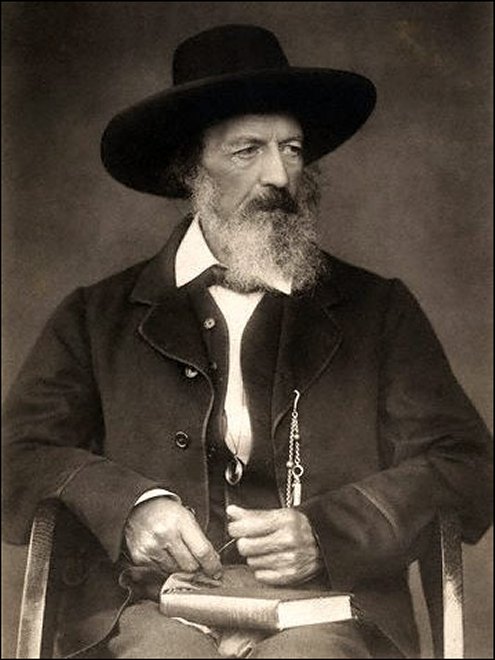
Alfred Lord Tennyson
(1809-1892)
T h e T a l k i n g O a k
Once more the gate behind me falls;
Once more before my face
I see the moulder’d Abbey-walls,
That stand within the chace.
Beyond the lodge the city lies,
Beneath its drift of smoke;
And ah! with what delighted eyes
I turn to yonder oak.
For when my passion first began,
Ere that, which in me burn’d,
The love, that makes me thrice a man,
Could hope itself return’d;
To yonder oak within the field
I spoke without restraint,
And with a larger faith appeal’d
Than Papist unto Saint.
For oft I talk’d with him apart,
And told him of my choice,
Until he plagiarised a heart,
And answer’d with a voice.
Tho’ what he whisper’d, under Heaven
None else could understand;
I found him garrulously given,
A babbler in the land.
But since I heard him make reply
Is many a weary hour;
‘Twere well to question him, and try
If yet he keeps the power.
Hail, hidden to the knees in fern,
Broad Oak of Sumner-chace,
Whose topmost branches can discern
The roofs of Sumner-place!
Say thou, whereon I carved her name,
If ever maid or spouse,
As fair as my Olivia, came
To rest beneath thy boughs.–
"O Walter, I have shelter’d here
Whatever maiden grace
The good old Summers, year by year,
Made ripe in Sumner-chace:
"Old Summers, when the monk was fat,
And, issuing shorn and sleek,
Would twist his girdle tight, and pat
The girls upon the cheek.
"Ere yet, in scorn of Peter’s-pence,
And number’d bead, and shrift,
Bluff Harry broke into the spence,
And turn’d the cowls adrift:
"And I have seen some score of those
Fresh faces, that would thrive
When his man-minded offset rose
To chase the deer at five;
"And all that from the town would stroll,
Till that wild wind made work
In which the gloomy brewer’s soul
Went by me, like a stork:
"The slight she-slips of loyal blood,
And others, passing praise,
Strait-laced, but all too full in bud
For puritanic stays:
"And I have shadow’d many a group
Of beauties, that were born
In teacup-times of hood and hoop,
Or while the patch was worn;
"And, leg and arm with love-knots gay,
About me leap’d and laugh’d
The Modish Cupid of the day,
And shrill’d his tinsel shaft.
"I swear (and else may insects prick
Each leaf into a gall)
This girl, for whom your heart is sick,
Is three times worth them all;
"For those and theirs, by Nature’s law,
Have faded long ago;
But in these latter springs I saw
Your own Olivia blow,
"From when she gamboll’d on the greens,
A baby-germ, to when
The maiden blossoms of her teens
Could number five from ten.
"I swear, by leaf, and wind, and rain
(And hear me with thine ears),
That, tho’ I circle in the grain
Five hundred rings of years–
"Yet, since I first could cast a shade,
Did never creature pass
So slightly, musically made,
So light upon the grass:
"For as to fairies, that will flit
To make the greensward fresh,
I hold them exquisitely knit,
But far too spare of flesh."
Oh, hide thy knotted knees in fern,
And overlook the chace;
And from thy topmost branch discern
The roofs of Sumner-place.
But thou, whereon I carved her name,
That oft hast heard my vows,
Declare when last Olivia came
To sport beneath thy boughs.
"O yesterday, you know, the fair
Was holden at the town;
Her father left his good arm-chair,
And rode his hunter down.
"And with him Albert came on his.
I look’d at him with joy:
As cowslip unto oxlip is,
So seems she to the boy.
"An hour had past–and, sitting straight
Within the low-wheel’d chaise,
Her mother trundled to the gate
Behind the dappled grays.
"But, as for her, she stay’d at home,
And on the roof she went,
And down the way you use to come,
She look’d with discontent.
"She left the novel half-uncut
Upon the rosewood shelf;
She left the new piano shut:
She could not please herself.
"Then ran she, gamesome as the colt,
And livelier than a lark
She sent her voice thro’ all the holt
Before her, and the park.
"A light wind chased her on the wing,
And in the chase grew wild,
As close as might be would he cling
About the darling child:
"But light as any wind that blows
So fleetly did she stir,
The flower she touch’d on dipt and rose,
And turn’d to look at her.
"And here she came, and round me play’d,
And sang to me the whole
Of those three stanzas that you made
About my ‘giant bole’;
"And in a fit of frolic mirth
She strove to span my waist:
Alas, I was so broad of girth,
I could not be embraced.
"I wish’d myself the fair young beech
That here beside me stands,
That round me, clasping each in each,
She might have lock’d her hands.
"Yet seem’d the pressure thrice as sweet
As woodbine’s fragile hold,
Or when I feel about my feet
The berried briony fold."
O muffle round thy knees with fern,
And shadow Sumner-chace!
Long may thy topmost branch discern
The roofs of Sumner-place!
But tell me, did she read the name
I carved with many vows
When last with throbbing heart I came
To rest beneath thy boughs?
"O yes, she wander’d round and round
These knotted knees of mine,
And found, and kiss’d the name she found,
And sweetly murmur’d thine.
"A teardrop trembled from its source,
And down my surface crept.
My sense of touch is something coarse,
But I believe she wept.
"Then flush’d her cheek with rosy light,
She glanced across the plain;
But not a creature was in sight:
She kiss’d me once again.
"Her kisses were so close and kind,
That, trust me on my word,
Hard wood I am, and wrinkled rind,
But yet my sap was stirr’d:
"And even into my inmost ring
A pleasure I discern’d
Like those blind motions of the Spring,
That show the year is turn’d.
"Thrice-happy he that may caress
The ringlet’s waving balm
The cushions of whose touch may press
The maiden’s tender palm.
"I, rooted here among the groves,
But languidly adjust
My vapid vegetable loves
With anthers and with dust:
"For, ah! my friend, the days were brief
Whereof the poets talk,
When that, which breathes within the leaf,
Could slip its bark and walk.
"But could I, as in times foregone,
From spray, and branch, and stem,
Have suck’d and gather’d into one
The life that spreads in them,
"She had not found me so remiss;
But lightly issuing thro’,
I would have paid her kiss for kiss
With usury thereto."
O flourish high, with leafy towers,
And overlook the lea,
Pursue thy loves among the bowers,
But leave thou mine to me.
O flourish, hidden deep in fern,
Old oak, I love thee well;
A thousand thanks for what I learn
And what remains to tell.
"’Tis little more: the day was warm;
At last, tired out with play,
She sank her head upon her arm,
And at my feet she lay.
"Her eyelids dropp’d their silken eaves.
I breathed upon her eyes
Thro’ all the summer of my leaves
A welcome mix’d with sighs.
"I took the swarming sound of life–
The music from the town–
The murmurs of the drum and fife
And lull’d them in my own.
"Sometimes I let a sunbeam slip,
To light her shaded eye;
A second flutter’d round her lip
Like a golden butterfly;
"A third would glimmer on her neck
To make the necklace shine;
Another slid, a sunny fleck,
From head to ancle fine.
"Then close and dark my arms I spread,
And shadow’d all her rest–
Dropt dews upon her golden head,
An acorn in her breast.
"But in a pet she started up,
And pluck’d it out, and drew
My little oakling from the cup,
And flung him in the dew.
"And yet it was a graceful gift–
I felt a pang within
As when I see the woodman lift
His axe to slay my kin.
"I shook him down because he was
The finest on the tree.
He lies beside thee on the grass.
O kiss him once for me.
"O kiss him twice and thrice for me,
That have no lips to kiss,
For never yet was oak on lea
Shall grow so fair as this."
Step deeper yet in herb and fern,
Look further thro’ the chace,
Spread upward till thy boughs discern
The front of Sumner-place.
This fruit of thine by Love is blest,
That but a moment lay
Where fairer fruit of Love may rest
Some happy future day.
I kiss it twice, I kiss it thrice,
The warmth it thence shall win
To riper life may magnetise
The baby-oak within.
But thou, while kingdoms overset,
Or lapse from hand to hand,
Thy leaf shall never fail, nor yet
Thine acorn in the land.
May never saw dismember thee,
Nor wielded axe disjoint,
That art the fairest-spoken tree
From here to Lizard-point.
O rock upon thy towery top
All throats that gurgle sweet!
All starry culmination drop
Balm-dews to bathe thy feet!
All grass of silky feather grow–
And while he sinks or swells
The full south-breeze around thee blow
The sound of minster bells.
The fat earth feed thy branchy root,
That under deeply strikes!
The northern morning o’er thee shoot
High up, in silver spikes!
Nor ever lightning char thy grain,
But, rolling as in sleep,
Low thunders bring the mellow rain,
That makes thee broad and deep!
And hear me swear a solemn oath,
That only by thy side
Will I to Olive plight my troth,
And gain her for my bride.
And when my marriage morn may fall,
She, Dryad-like, shall wear
Alternate leaf and acorn-ball
In wreath about her hair.
And I will work in prose and rhyme,
And praise thee more in both
Than bard has honour’d beech or lime,
Or that Thessalian growth,
In which the swarthy ringdove sat,
And mystic sentence spoke;
And more than England honours that,
Thy famous brother-oak,
Wherein the younger Charles abode
Till all the paths were dim,
And far below the Roundhead rode,
And humm’d a surly hymn.
.jpg)
Alfred Lord Tennyson poetry
kempis poetry magazine
More in: Tennyson, Alfred Lord
.jpg)
.jpg)
Adriaan en de anderen
Een toekomstroman waarin de literatuur wordt gered
en het Huis van Oranje tot bloei komt
door Merel van der Gracht
zesentwintig
De last van onsterfelijkheid
Na zijn overlijden was Willem Frederik Stermans op een lange zwerftocht door het heelal geraakt. Met een koffertje vol eigen boeken, enkele stelletjes ondergoed en versteende tubes tandpasta, zwierf hij van ster naar ster, op zoek naar een verblijfplaats voor de eeuwigheid. Maar de sterren, waarnaar hij op vele zomeravonden had zitten staren, bleken onherbergzaam, kil en leeg. Er was niets en niemand om tegen tekeer te gaan. Niemand om de pen tegen op te nemen. Geen mens op wie hij zich kwaad kon maken. In de ruimte van het eeuwige leven was hij vooral alleen. Hij vond het zelf wel wat vreemd dat hij er zo slecht tegen kon: op aarde had hij zich altijd afgezonderd en had hij iedereen die in zijn blikveld kwam uit zijn wereldje verdreven. Na zijn dood, dat besefte hij, was hij anders geworden.
Willem Frederik was een beetje moedeloos. Hij had er nooit op gerekend dat hij na zijn dood nog zou bestaan en als een zwerver door het heelal moest reizen. Nu bleek dat de last van onsterfelijkheid zwaar was, moest hij een mooie plek voor het lezen van zijn formidabele prachtboeken zien te vinden. Al was het maar om de tijd te doden, tot hij eindelijk, misschien over een paar honderd jaar, bij de dames Wolff en Deken en de heren Slauerhoff, Roland Holst en de onlangs overleden tijdelijke ster Bruun, kon worden bijgezet. Oh, hoe zalig zou het zijn om geheel te zijn vergeten. Nu begreep hij pas dat zijn collega’s Joop Harten en Steven Mangracht het geluk van te-zijn-vergeten al tijdens hun leven deelachtig waren geworden. Waar vond hij rust? Zijn tubes tandpasta waren al jaren zo hard als beton.
Plotseling zag hij een ster die groter was dan de andere sterren, die hij eerder had bereisd.
Hij klampte zich vast aan een lichtstraal en gleed ernaar toe. Dichterbij gekomen, zag hij een lichtgevende gouden poort.
HEMELPOORT stond er in koeienletters op. Vette kapitalen, net zo ergerlijk groot als vroeger op de omslagen van de romans van Jan Wolkmens die trachtten te verhullen dat de inhoud van zijn boeken kleintjes was.
‘Dit kan echt niet,’ mompelde Willem Frederik voor zich heen. ‘Elk weldenkend mens weet dat de hemel niet bestaat. De een of andere griezelige professor uit Groningen heeft me onder hypnose gebracht om me te pesten. Een trap na.’
Hij stapte op de poort af, klopte aan, toch benieuwd naar wat er ging gebeuren.
Een oude man met een baard deed open.
‘Welkom in de hemel,’ zei de man.
‘Wie bent u?’
‘Dat weet zelfs het kleinste kind,’ zei de oude man narrig.
‘Ja maar,’ stamelde Willem Frederik, ‘dat is enkel een verhaaltje. De hemel bestaat niet.’
‘En wat is dit dan?’ vroeg Petrus, liet hem binnen en gunde hem een blik op bloeiende tuinen met geurende bloemen, klaterende watervallen en meertjes met badende engeltjes.
‘Dit moet autosuggestie zijn,’ zei Willem Frederik. ‘Ik ben op zoek naar een geschikte plek waar ik eindeloos mijn meesterwerken kan lezen. Zo’n mooie plek als dit moet het zijn. Maar de hemel?’
‘Jij bent net als Thomas,’ zei Petrus. ‘Kom mee, dan stel ik je voor aan God.’
Willem Frederik kon zijn ogen en zijn oren nog steeds niet geloven. Het liefst zou hij hier blijven, het was een bekoorlijke plek, en de dametjes die hier rondliepen zagen er ook allemaal goed uit, maar zijn innerlijke stem zei hem dat dit allemaal niet écht kon zijn.
Op een bankje zat een man van Willem Frederiks leeftijd, verdiept in een boek.
‘Ik heb iemand voor U,’ zei Petrus. ‘Hij is een beetje raar.’
‘Wie bent u?’ vroeg de man opkijkend.
‘Ik ben een dolende ziel op zoek naar rust,’ zei Willem Frederik. ‘Wie bent u?’
‘Ik ben God.’
‘God bestaat niet,’ zei de schrijver hard. ‘U kunt zeggen wat u wilt, maar God bestaat écht niet. En ík heb altijd gelijk.’
‘Flikker hem de poort uit,’ zei God tegen Petrus. ‘Zo’n zuurbak wil ik helemaal niet in mijn Paradijs hebben.’
‘Waar stuur ik hem naartoe?’ vroeg Petrus.
‘Laat hem maar naar de maan gaan,’ zei God. Hij pakte zijn boek op en las verder.
‘Kom mee,’ zei Petrus.
‘Mag… mag… ik u nog wat vragen?’ vroeg Willem Frederik.
‘Nou ja, voor deze keer.’
‘Wat leest u daar?’
‘Een heel goed boek,’ zei God. ‘Het is geschreven door ene Willem Frederik Stermans. Het heet De tranen der acacia’s. Het is geweldig. Deze man is echt onsterfelijk.’
‘Dus toch!’ riep Willem Frederik uit. ‘Die Willem Frederik Stermans dat ben ík! Ik ben dus echt onsterfelijk.’
‘Jaag hem weg,’ zei God korzelig tegen Petrus. ‘Die vent is echt een beetje gek. Hij lijdt nog aan hoogmoedswaanzin ook. Hij zal ook wel denken dat hij Napoleon is. Schop hem de poort uit.’
‘Maar maar, ik ben écht Willem Frederik Stermans!’ riep Willem Frederik ontdaan.
‘Als je het écht bent, is het des te erger,’ zei God wat pinnig. ‘Dat een grote geest mijn bestaan ontkent, is onvergeeflijk.’
‘Maar als ik dan toch…,’ probeerde de schrijver zijn zielenheil te redden, en hij loerde naar de mooie engelen die in hun blootje onder een waterval stonden.
‘Ik heb nog groter geesten uit het Paradijs weggestuurd,’ zei God. ‘Lucifer. Die duivel voelde zich aan mij gelijk. Maar hij was niet eens zo’n groot zondaar als jij, die mijn bestaan gewoon ontkent. Verdwijn!’
Petrus pakte Willem Frederik bij de arm.
Ze liepen terug naar de hemelpoort.
Willem Frederik voelde al een beetje berouw, vooral toen een paar mooie serafijnen aan hem voorbijvlogen en hij de warme appeltaart rook die net was gebakken.
‘Als dit alles echt bestaat, is al mijn schrijven voor niets geweest,’ klaagde Willem Frederik. ‘En dat kan niet.’ Toen hij die woorden had uitgesproken, hervond hij zichzelf weer. Hij bleef bij zijn gelijk. Dit alles was fictie, een waan, zoals toen hij eens voor de gein LSD had genomen, samen met vriendje Sijmen Eksteroog. Droombeelden. Dit kón gewoon niet waar zijn! Basta!
Ze waren terug bij de poort.
‘Die kant op,’ zei Petrus.
Heel ver weg zag Willem Frederik de sikkel van de maan. Hij wist dat het daar koud en eenzaam was.
Petrus reikte hem een zonnestraal aan.
‘Nou, hou je vast. We zetten je af op de maan.’ Hij sloot de hemelpoort.
Met de snelheid van het licht vloog Willem Frederik door de ruimte. Even later plofte hij neer op de maan.
Hij keek om zich heen. Een kale steenvlakte. Maar wat was dat? Ha! Er stond een karretje. Dat hadden ruimtevaarders ooit achtergelaten.
Hij klom er in. Hij kon er net in zitten.
In een kastje vond hij een sterke kijker. Hij richtte hem naar de aarde. Tot zijn verbazing keek hij recht in het hart van zijn ooit zo geliefde én gehate Amsterdam.
Voor Adriaan en de anderen: het volledige verhaal vanaf hoofdstuk 1…..HIER…..
.jpg)
Hoofdstuk 26 – Maandag 19 april 2010 (vervolg dinsdag)
Adriaan en de anderen verschijnt op 7 mei 2010 bij Uitgeverij Compaan in Maassluis, ISBN: 978-94-903740-6-8, Aantal pagina’s: 288, prijs: € 17,90
E-mail: merelvandergracht X kempis.nl ( X = @ )
kempis poetry magazine
More in: -Adriaan en de Anderen, Merel van der Gracht
.jpg)
William Shakespeare
(1564-1616)
THE SONNETS
32
If thou survive my well-contented day,
When that churl death my bones with dust shall cover
And shalt by fortune once more re-survey
These poor rude lines of thy deceased lover:
Compare them with the bett’ring of the time,
And though they be outstripped by every pen,
Reserve them for my love, not for their rhyme,
Exceeded by the height of happier men.
O then vouchsafe me but this loving thought,
‘Had my friend’s Muse grown with this growing age,
A dearer birth than this his love had brought
To march in ranks of better equipage:
But since he died and poets better prove,
Theirs for their style I’ll read, his for his love’.
![]()
kempis poetry magazine
More in: -Shakespeare Sonnets
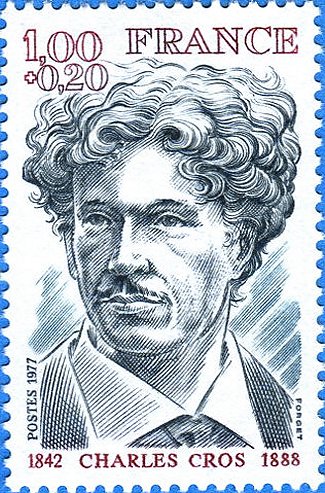
C h a r l e s C r o s
(1842-1888)
L e s q u a t r e s a i s o n s
Les quatre saisons – L’automne
L’automne fait les bruits froissés
De nos tumultueux baisers.
Dans l’eau tombent les feuilles sèches
Et sur ses yeux, les folles mèches.
Voici les pèches, les raisins,
J’aime mieux sa joue et ses seins.
Que me fait le soir triste et rouge,
Quand sa lèvre boudeuse bouge ?
Le vin qui coule des pressoirs
Est moins traître que ses yeux noirs
Les quatre saisons – L’été
En été les lis et les roses
Jalousaient ses tons et ses poses,
La nuit, par l’odeur des tilleuls
Nous nous en sommes allés seuls.
L’odeur de son corps, sur la mousse,
Est plus enivrante et plus douce.
En revenant le long des blés,
Nous étions tous deux bien troublés.
Comme les blés que le vent frôle,
Elle ployait sur mon épaule.
Les quatre saisons – L’hiver
C’est l’hiver. Le charbon de terre
Flambe en ma chambre solitaire.
La neige tombe sur les toits.
Blanche ! Oh, ses beaux seins blancs et froids !
Même sillage aux cheminées
Qu’en ses tresses disséminées.
Au bal, chacun jette, poli,
Les mots féroces de l’oubli,
L’eau qui chantait s’est prise en glace,
Amour, quel ennui te remplace !
Les quatre saisons – Le printemps
Au printemps, c’est dans les bois nus
Qu’un jour nous nous sommes connus.
Les bourgeons poussaient vapeur verte.
L’amour fut une découverte.
Grâce aux lilas, grâce aux muguets,
De rêveurs nous devînmes gais.
Sous la glycine et le cytise,
Tous deux seuls, que faut-il qu’on dise ?
Nous n’aurions rien dit, réséda,
Sans ton parfum qui nous aida.
.jpg)
Charles Cros poetry
kempis poetry magazine
More in: Archive C-D, Cros, Charles
.jpg)
Multatuli
(1820-1887)
Ideën (7 delen, 1862-1877)
Idee Nr. 30
By ‘t beschouwen van een kunstwerk, by ‘t schatten ener uitstekende daad, by ‘t beoordelen van een uitgedrukte gedachte, leg ik myzelf altyd de vraag voor: wat is er omgegaan in de ziel des kunstenaars, van de held, van de wysgeer, om dat ideaal te scheppen, om tot die daad te besluiten, om die gedachte voort te brengen, en ze vorm te geven als denkbeeld? Dat is: ik vraag, hoe de ziel bevrucht werd? Welke toestanden ze doorliep by dracht en verlossing?
Welnu, de geschiedenis ener grote conceptie roept me altyd de tekst toe: met smart zult ge kinderen baren!
Als ‘n graankorrel spreken kon, zou ze klagen dat er smart ligt in ‘t ontkiemen.
Helden, artiesten en wysgeren zullen my begrypen, en de klacht van die graankorrel verstaan.
kempis poetry magazine
More in: DICTIONARY OF IDEAS, Multatuli, Multatuli
Thank you for reading Fleurs du Mal - magazine for art & literature